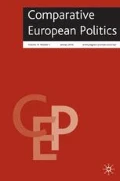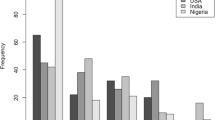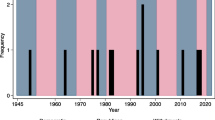Abstract
This article empirically investigates how media coverage of European Union (EU) policy-formulation affects the involvement of national parliaments in these processes. The literature has variously argued that the involvement of national parliaments in EU policy-formulation is unrelated to media coverage, that media strengthen the hand of backbenchers and opposition or that media reinforce executive dominance. Using a mixed methodology research design for a longitudinal case study of debates on the EU budget in the Netherlands between 1992 and 2005, this article presents evidence for all three hypotheses, but with clear variations over time. Although institutional arrangements clearly structure parliamentary involvement limiting media effects, its explanatory power decreases as the intensity of debate increases. Limited media coverage reinforces executive dominance whereas extensive media coverage provides a weapon of the weak and strengthens the involvement of parliaments in general, and opposition parties in particular.

Similar content being viewed by others
Notes
The codebook used in the empirical analysis as well as the coding results can be obtained from the author upon request.
The search string for both media and parliamentary documents consisted of three search terms: ‘EU budget’ (‘EC budget’ in 1992) OR ‘European budget’ OR ‘Delors II’/‘Agenda 2000’/‘Financial Perspectives’. As each search term consists of a word combination, false hits were negligible.
The total sample for qualitative coding included 158 newspaper articles and 20 transcripts of plenary debates. A total of 1,580 claims were subtracted. The heuristic files containing original documents and coding, the database and the codebook are available from the author upon request.
All translations from Dutch to English by the author.
References
Altheide, D.L. (2004) Media logic and political communication. Political Communication 21: 293–296.
Auel, K. and Benz, A. (2005) The politics of adaptation: The Europeanisation of national parliamentary systems. Journal of Legislative Studies 11 (3/4): 372–393.
Bergman, T. (1997) National parliaments and EU affairs committees: Notes on empirical variation and competing explanations. Journal of European Public Policy 4 (3): 373–387.
Bergman, T. (2000) The European Union as the next step of delegation and accountability. European Journal of Political Research 37 (3): 415–429.
Burns, T.R. (1999) The evolution of parliaments and societies in Europe: Challenges and prospects. European Journal of Social Theory 2 (2): 167–194.
De Vreese, C.H. (2001) ‘Europe’ in the news: A cross-national comparative study of the news coverage of key EU events. European Union Politics 2 (3): 283–309.
De Vreese, C.H. and Kandyla, A. (2009) News framing and public support for a common foreign and security policy. Journal of Common Market Studies 47 (3): 453–481.
Eriksen, E.O. and Fossum, J.E. (2002) Democracy through Strong Publics in the European Union? Journal of Common Market Studies 40 (3): 401–424.
European Union. (2008) Consolidated versions of the treaty on European Union and the treaty on the functioning of the European Union. Official Journal of the European Union, 51/C115 .
Galtung, J. and Ruge, M.H. (1965) The structure of foreign news: The presentation of the Congo, Cuba and Cyprus Crises in four Norwegian newspapers. Journal of Peace Research 2 (1): 64–91.
Gamson, W.A. (2004) Bystanders, public opinion, and the media. In: D.A. Snow, S.A. Soule and H. Kriesi (eds.) The Blackwell Companion to Social Movements. Oxford, UK: Blackwell Publishing, pp. 242–261.
Hoetjes, B.J.S. (2001) The parliament of the Netherlands and the European Union: Early starter, slow mover. In: A. Maurer and W. Wessels (eds.) National Parliaments on their Ways to Europe: Losers or Latecomers? Baden-Baden, Germany: Nomos Verlagsgesellschaft, pp. 337–358.
Holzhacker, R. (2002) National parliamentary scrutiny over EU Issues: Comparing the goals and methods of governing and opposition parties. European Union Politics 3 (4): 459–479.
Holzhacker, R. (2005) The Power of opposition parliamentary party groups in European scrutiny. Journal of Legislative Studies 11 (3/4): 428–445.
Katz, R.S. and Mair, P. (1995) changing models of party organization and party democracy. Party Politics 1 (1): 5–28.
Kiiver, P. (2006) The National Parliaments in the European Union. A Critical View on EU Constitution-Building. The Hague, the Netherlands: Kluwer Law International.
King, A. (1976) Modes of executive-legislative relations: Great Britain, France, and West Germany. Legislative Studies Quarterly 1 (1): 11–36.
Koele, T. (1992) Zuinige reacties nu Delors komt met rekening van Maastricht. Trouw, 13 February, p. 9.
Koopmans, R. (2002) Codebook for the analysis of political mobilisation and communication in European public spheres. Europub.com Project, http://europub.wz-berlin.de.
Koopmans, R. and Erbe, J. (2004) Towards a european public sphere? vertical and horizontal dimensions of Europeanized political communication. Innovation 17 (2): 97–118.
Koopmans, R. and Statham, P. (1999) Political claims analysis: Integrating protest event and political discourse approaches. Mobilization: An International Quarterly 4 (2): 203–221.
Laffan, B. (1997) The Finances of the European Union. London: Palgrave MacMillan.
Lindner, J. (2006) Conflict and Change in EU Budgetary Politics. Abingdon, UK: Routledge.
Lord, C. and Beetham, D. (2001) Legitimizing the EU: Is there a ‘Post-parliamentary Basis’ for its legitimation? Journal of Common Market Studies 39 (3): 443–462.
MacCarthaigh, M. (2007) Accountability through national parliaments: Practice and problems. In: J. O’Brennan and T. Raunio (eds.) National Parliaments within the Enlarged European Union. From ‘Victims’ of Integration to Competitive Actors? Abingdon, UK: Routledge, pp. 29–45.
Maurer, A. and Wessels, W. (eds.) (2001) National Parliaments on their Ways to Europe: Losers or Latecomers? Baden-Baden, Germany: Nomos Verlagsgesellschaft.
McCubbins, M.D., Noll, R.G. and Weingast, B.R. (1987) Administrative procedures as instruments of political control. Journal of Law, Economics and Organization 3 (2): 243–277.
Meyer, C. (1999) Political Legitimacy and the invisibility of politics: Exploring the European Union's communication deficit. Journal of Common Market Studies 37 (4): 617–639.
Møller Sousa, M. (2008) Learning in denmark? the case of danish parliamentary control over European Union policy. Scandinavian Political Studies 31 (4): 428–447.
Norton, P. (1996a) Introduction: Adapting to European integration. In: P. Norton (ed.) National Parliaments and the European Union. London: Frank Cass, pp. 1–11.
Norton, P. (ed.) (1996b) National Parliaments and the European Union. London: Frank Cass.
NRC Handelsblad (1997) Netto bijdrage. 17 September, p. 7.
NRC Handelsblad (2005) Europese subsidies. 30 August, p. 3.
O’Brennan, J. and Raunio, T. (2007a) Conclusion: National Parliaments gradually learning to play the European game? In: J. O’Brennan and T. Raunio (eds.) National Parliaments within the Enlarged European Union. From ‘Victims’ of Integration to Competitive Actors? Abingdon, UK: Routledge, pp. 272–286.
O’Brennan, J. and Raunio, T. (2007b) Introduction: Deparliamentarization and European integration. In: J. O’Brennan and T. Raunio (eds.) National Parliaments within the Enlarged European Union. From ‘Victims’ of Integration to Competitive Actors? Abingdon, UK: Routledge, pp. 1–26.
O’Brennan, J. and Raunio, T. (eds.) (2007c) National Parliaments within the Enlarged European Union. From ‘Victims’ of Integration to Competitive Actors? Abingdon, UK: Routledge.
Peter, J., Semetko, H.A. and de Vreese, C.H. (2003) EU politics on television news: A cross-national comparative study. European Union Politics 4 (3): 305–327.
Pierron, J.-C. (2003) The European parliament and the media. In: M. Bond (ed.) Europe, Parliament and the Media. London: The Federal Trust, pp. 167–188.
Pollack, M.A. (1997) Delegation, agency, and agenda setting in the European community. International Organization 51 (1): 99–134.
Pollak, J. and Slominski, P. (2003) Influencing EU politics? the case of the Austrian parliament. Journal of Common Market Studies 41 (4): 707–729.
Raunio, T. (2005) Holding governments accountable in European affairs: Explaining cross-national variation. Journal of Legislative Studies 11 (3/4): 319–342.
Raunio, T. (2007) National legislatures in the EU constitutional treaty. In: J. O’Brennan and T. Raunio (eds.) National Parliaments within the Enlarged European Union. From ‘Victims’ of Integration to Competitive Actors? Abingdon, UK: Routledge, pp. 79–92.
Raunio, T. and Hix, S. (2001) Backbenchers learn to fight back: European Integration and parliamentary government. In: K.H. Goetz and S. Hix (eds.) Europeanised Politics? European Integration and National Political Systems. London: Frank Cass, pp. 142–168.
Read, M. and Marsh, D. (2002) Combining qualitative and quantitative methods. In: D. Marsh and G. Stoker (eds.) Theory and Methods in Political Science, 2nd edn. Basingstoke, UK: Palgrave MacMillan, pp. 231–248.
Saalfeld, T. (2005) Deliberate delegation or abdication? government backbenchers, ministers and European Union legislation. Journal of Legislative Studies 11 (3/4): 343–371.
Schattschneider, E.E. (1960) The Semisovereign People. A Realist's View of Democracy in America. NY, USA: Holt, Rinegart and Winston.
Semetko, H.A. and Valkenburg, P.M. (2000) Framing European politics: A content analysis of press and television news. Journal of Communication 50 (2): 93–109.
Smith, E. (ed.) (1996) National Parliaments as Cornerstones of European Integration. London: Kluwer Law International.
Statham, P. (2005) Forging Divergent and ‘Path Dependent’ Ways to Europe?: Political Communication over European Integration in the British and French Public Spheres. EurPolCom, University of Leeds, European Political Communication Working Paper Series, 2005/11.
Strøm, K. (2000) Delegation and accountability in parliamentary democracies. European Journal of Political Research 37 (3): 261–289.
Strøm, K., Müller, W.C. and Bergman, T. (eds.) (2003) Delegation and Accountability in Parliamentary Democracies. Oxford, UK: Oxford University Press.
Tans, O., Zoethout, C. and Peters, J. (eds.) (2007) National Parliaments and European Democracy: A Bottom-up Approach to European Constitutionalism. Groningen, the Netherlands: Europa Law Publishing.
Tweede Kamer. (1992) Behandeling van het Verslag van de Europese Raad te Edinburgh d.d. 11 en 12 december 1992. Handelingen 1992–1993, Tweede Kamer der Staten-Generaal, TK 37, 2818–2850.
Tweede Kamer. (1998a) Behandeling van het verslag van Cardiff d.d. 15 en 16 juni 1998. Handelingen 1997–1998, Tweede Kamer der Staten-Generaal, TK 89, 6043–6065.
Tweede Kamer. (1998b) Het Debat over de Europese Top. Handelingen 1998–1999, Tweede Kamer der Staten-Generaal, TK 39, 2800–2822.
Tweede Kamer. (1999) Debat naar aanleiding van een algemeen overleg op 11 februari over Agenda 2000. Handelingen 1998–1999, Tweede Kamer der Staten-Generaal, TK 51, 3382–3387.
Tweede Kamer. (2005a) Debat over de Europese Top van 16 en 17 juni 2005. Handelingen 2004–2005, Tweede Kamer der Staten-Generaal, TK 93, 5578–5612.
Tweede Kamer. (2005b) Vragen van het lid Timmermans aan de ministerpresident en de minister van Landbouw, Natuur en Voedselkwaliteit over het kabinetsstandpunt inzake de Nederlandse inzet bij de discussie over de hervorming van het gemeenschappelijk landbouwbeleid van de Europese Unie en de gewenste verlaging van uitgaven daarvoor. Vragenuur, Tweede Kamer der Staten-Generaal, TK 27–1847.
Van Noije, L., Kleinnijenhuis, J. and Oegema, D. (2008) Loss of parliamentary control due to mediatization and Europeanization: A longitudinal and cross-sectional analysis of Agenda building in the United Kingdom and the Netherlands. British Journal of Political Science 38 (3): 455–478.
Walgrave, S., Soroka, S. and Nuytemans, M. (2008) The mass media's political agenda-setting power: A longitudinal analysis of media, parliament, and government in Belgium (1993–2000). Comparative Political Studies 41 (6): 814–836.
Acknowledgements
The author would like to thank Hans-Jörg Trenz, Christopher Lord, Guri Rosén, Ulf Sverdrup and four anonymous reviewers for valuable comments. The usual disclaimer applies.
Author information
Authors and Affiliations
Rights and permissions
About this article
Cite this article
de Wilde, P. No effect, weapon of the weak or reinforcing executive dominance? How media coverage affects national parliaments’ involvement in EU policy-formulation. Comp Eur Polit 9, 123–144 (2011). https://doi.org/10.1057/cep.2009.13
Published:
Issue Date:
DOI: https://doi.org/10.1057/cep.2009.13




